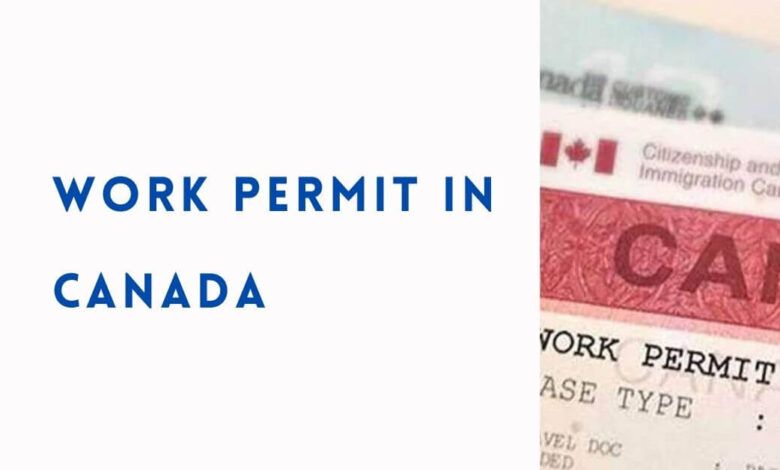Work Permit in Canada 2025 – Work in Canada

You are all invited to a conversation that is vital for anyone considering obtaining a work visa in Canada. This will analyze a substantial modification to the work permit compensation requirement in Canada, which is scheduled to be implemented. Understanding this transition is critical for anyone, including employers, skilled workers, and those aspiring to become immigrants.
The Temporary Foreign Worker Program was revised by the Minister of Employment and Social Development of Canada, Randy Boissonnault.
Check Also: Belgium Work Visa Process – Belgium Work Permit
Workforce Solutions Road Map
The road map has been revised to more accurately reflect the current labor market condition and the economy’s long-term prospects. Employers will be required to annually review and modify the wages of temporary foreign workers to reflect increases in the prevailing wage rates for that particular occupation and location in Canada.
By implementing routine wage adjustments, these assessments will ensure that employers remunerate temporary foreign workers at the prevailing market rate throughout their employment period. Additionally, it was announced by the Canadian government that additional measures would be prolonged and implemented. These will be evaluated in consideration of forthcoming labor market and economic developments.
This consists of;
To begin with, employers are permitted to operate in seven designated sectors if the clause is preserved.
- Nutrition and Lodging Services
- Establishment Construction
- Production of timber goods and associated merchandise
- Manufacturing of food
- Budget Lodging
- Residential care establishments
As a result, they should employ no more than 30 percent of their immigrant workforce in low-paying positions.
- Furthermore, maintaining the maximum employment tenure of two years for positions paying less than the median hourly wage of the province or territory
- To more accurately reflect the labor market, the utmost validity period of the labor market effect assessment has been reduced from 18 months to 12 months.
The Workforce Solutions roadmap of the TFW program assists Canadian employers in meeting labor market demands while preserving jobs and wages. To ensure that the program adequately safeguards temporary foreign laborers in Canada and adapts to fluctuations in the national economy, ESDC will diligently monitor the market.
Details of Work Permit in Canada
The quantity of newly generated files has increased by approximately 40% year-to-date in comparison to the corresponding period of the preceding fiscal year. This indicates that throughout the preceding fiscal year, demand for the temporary foreign worker program remained consistently high.
The TFWP also designated the LMIA website as the principal means of submitting LMIAs. By transitioning to an online system, organizations can now efficiently meet the demands of the labor market and substantially enhance their operations. Recently, the government implemented the Recognized Employer Pilot (REP), a program designed to assist businesses that prioritize employee safety.
REP aims to safeguard transient foreign workers, reduce administrative burdens for companies that have previously adhered to the program, and enhance their capacity to address labor shortages through the simplification of business processes.
Benefits of Work Permit in Canada
- Procurement of Employment Opportunities: Possessing a work permit grants one access to an extensive array of employment prospects spanning diverse sectors throughout Canada. This enables you to legally earn a living and operate in the country.
- Life-Work Balance: It is well-known that Canada values work-life balance. Numerous Canadian employers prioritize the well-being of their employees by providing policies and benefits that promote a healthy work-life balance.
- Obtaining Social Services: Work permit holders in Canada can avail themselves of social services, including education and healthcare, which subsequently enhance their families and their standard of living.
- The Value of Cultural Diversity: Canada is a culturally diverse nation that welcomes immigrants with open arms. Employment in Canada facilitates the encounter of diverse cultures and points of view, thereby fostering personal development and augmentation.
- Career Advancement: Employment in Canada may present prospects for professional growth and career progression. The nation possesses a robust labor market and numerous sectors that highly regard proficient personnel.
- Educational Prospects: Canada is host to an abundance of esteemed academic establishments. Possessors of work permits may be granted access to educational opportunities that enhance their qualifications and skills, either through employer support or independent study.
- The Way to Permanent Residency: Certain work permits may facilitate the acquisition of permanent residency status in Canada. Specific programs and segments give preference to candidates who possess work experience in Canada, thereby streamlining the permanent residency application process.
- Constraints of Living: Its favorable social amenities, secure environment, and high standard of living make Canada an appealing location to both reside and conduct business.
- Obtaining Benefits: Numerous employers offer employee privileges and benefits, including healthcare coverage and retirement plans, that contribute to the well-being and financial security of their staff.
- Relationships and Networking: Individuals who work in Canada have the opportunity to establish valuable professional networks and connections that can significantly contribute to their personal growth, business prospects, and career advancement.
What is the Temporary Foreign Worker Program (TFWP)
In the absence of eligible Canadians or permanent residents, Canadian businesses may temporarily employ foreign laborers through the temporary foreign worker program.
How long does it take to process a work permit for Canada?
As of the most recent IRCC processing update, 80% of online work permit applications in Canada have been processed in an average of 134 days over the past half-year. It should be noted that the processing time for a work permit in Canada can vary depending on several factors, such as the location of the application, the sort of permit, and the season.
Regarding the forthcoming modifications to Canada’s wage prerequisites for work permits, we conclude our discussion. Those who wish to operate in Canada or recruit qualified professionals must remain current on these trends. Continue to provide perceptive analysis on employment and immigration-related topics on our channel. Stay tuned for additional information.
Most In-Demand Job Professions in Canada
This article will discuss the top 27 in-demand occupations in Canada that are supported by immigration. Immigration is vital to Canada’s survival. Annually, Canada receives an unprecedented influx of immigrants, who occupy the nation’s most sought-after occupations for a variety of reasons, including demographic shifts, expanding industries, and labor shortages.
Even though some individuals oppose the acceptance of large numbers of immigrants on account of the ongoing housing crisis and affordability concerns, it is crucial to keep in mind that immigrants support and contribute to numerous vital industries by filling employment voids. This comprises the sectors and high-demand occupations that support Canada’s healthcare workforce and provide employment for a significant proportion of immigrants.
The Healing Hands of the Immigrants Proficient laborers are perpetually sought after in the healthcare industry, and immigrants play a vital role in filling these vacancies. Canada is home to an extensive array of international healthcare professionals, such as physicians, nurses, pharmacists, and allied health practitioners.
Because an aging population requires increased medical support and attention, healthcare professionals will perpetually be in demand.
For More Info:
Email Your CV, and We’ll Find the Best Pathway For you: info@www.freevisasponsorshipjobs
Frequently Asked Questions:
-
How do I get a work permit in Canada?
To apply for a work permit, most candidates will need a Canadian job offer supported by a Labor Market Impact Assessment (LMIA). There are some exceptions to this requirement where foreign workers can apply for a work permit without an LMIA.
-
Is Canada issuing work permits now?
Approved applicants will receive an open-ended work permit for up to three years, which means they can work for almost any employer anywhere in Canada. Their spouses and dependents will also be eligible to apply for a temporary resident visa.
-
What kind of work permit is required in Canada?
There are two types of work permits: open work permits and employer-specific work permits. An open work permit allows you to work for any employer in Canada, except for an employer who is listed as ineligible on the list of employers who have failed to comply with the conditions.




